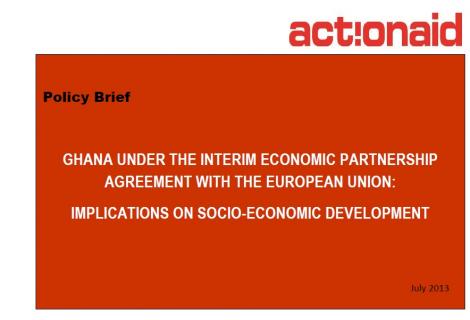
Ghana under the interim Economic Partnership Agreement with the European Union: Implications on socio-economic development
The Economic Partnership Agreement (EPA) between the European Union (EU) and African, Caribbean and Pacific (ACP) countries has been fraught with disagreement since it was initiated over ten years ago. While the EU hails the agreement as a new form of partnership that will promote economic growth and poverty reduction in ACP countries, ACP countries are sceptical about the impact that EPAs will have on their developmental priorities especially, smallholder agricultural development, government revenues, unemployment, poverty, and food security.
EPAs are a type of 'preferential trade' agreement in which both sides agree to reduce the taxes (tariffs) on goods coming in (i.e. import duties) and going out (i.e. export taxes) of their countries. The EPA sought to replace the trade chapters of the Cotonou Agreement which granted non-reciprocal (free) access to the EU market until 2008 with a non-discriminatory trade agreement in order to comply with WTO rules.
Following strong opposition to the original EPA by African countries, the EU introduced an interim EPA in 2007. Only four (4) out of the 47 eligible African countries have ratified an interim EPA. In West Africa, Ghana and La Cote d’Ivoire remain the only countries from the Economic Community of West African States (ECOWAS) to have initialled the interim EPA as of 2012. However, Cote d’Ivoire has gone ahead to sign while Ghana is yet to sign and ratify the interim agreement with the EU.
Given that Ghana is yet to fully commit to the EPA, policy makers and politicians have the opportunity to thoroughly consider the implications of signing a full EPA on the socio-economic development of Ghana. This policy brief provides information and practical guidance to policy makers and other stakeholders on the socio-economic implications of the EPA.
Policy Brief
GHANA UNDER THE INTERIM ECONOMIC PARTNERSHIP AGREEMENT WITH THE EUROPEAN UNION:
IMPLICATIONS ON SOCIO-ECONOMIC DEVELOPMENT
July 2013
July 2013